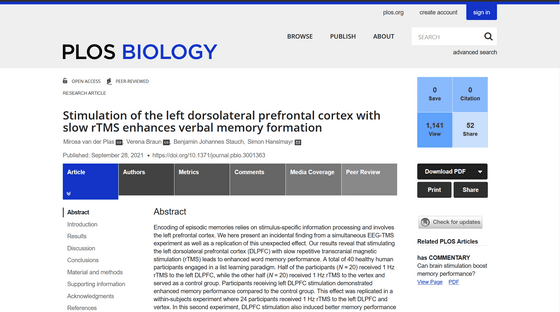Research results show that applying electrical stimulation to the brain improves memory

Humans often forget what they remember, such as not being able to remember the dinner two days ago or the words they desperately remembered for the exam. Researchers in the United Kingdom have published a treatise showing that 'electric stimulation to specific parts of the brain may be effective' in improving memory.
Stimulation of the left dorsolateral prefrontal cortex with slow rTMS enhances verbal memory formation

University of Glasgow --University news --Magnetic stimulation of the brain can improve episodic memory
Magnetic Stimulation Can Help The Brain to Remember, New Evidence Suggests
https://www.sciencealert.com/a-certain-type-of-magnetic-stimulation-could-help-the-brain-remember
Professor Simon Hanslmayer and colleagues at the University of Glasgow have focused on studies in which a region of the human brain called the 'left dorsolateral prefrontal area (DLPFC)' is deeply involved in memory formation. I thought that it would be possible to support memory by stimulating DLPFC, so I conducted an experiment.
Hanslemeier conducted a simple test in which 40 subjects were made to memorize multiple words. The subjects were instructed to memorize the word, then perform another short task, and then remember the word. As subjects memorized words, half of the subjects received 1 Hz repeated transcranial magnetic stimulation (rTMS) on the parietal lobe and the other half on DLPFC.

The results showed that the DLPFC-stimulated group had better test results than the parietal-stimulated group. Examination of the electroencephalogram data recorded during the experiment revealed that the stimulus given to DLPFC suppressed the activity of the parietal lobe, which controls attention and perception. Hansle Meyer concluded, 'It seems that the stimulus caused DLPFC to suppress other parts of the body, which seemed to improve memory.'
The method of stimulating the brain with rTMS is expected to be effective in the treatment of depression, etc., and is expected to bring about new changes in neurological symptoms such as memory impairment. Mr. Hansle Meyer will continue research on 'which part of the brain should be stimulated for the best effect'. 'These are complex but interesting effects that require further experimentation to better understand the neural basis,' said Hansle Meyer.

Related Posts:
in Science, Posted by log1p_kr







